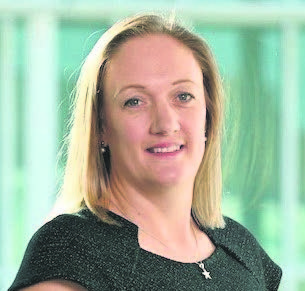Climate risk, cyber and ESG high on board agendas for 2022
BY JONATHAN KENT
Amid the economic turmoil of the pandemic, Bermuda’s flagship international re/insurance industry has been an anchor of stability. Beyond just surviving these testing times, it has actually grown with the influx of billions of dollars of new risk capital and slew of start-ups known as the Class of 2020. Can the bright light of the Bermuda economy continue to shine in 2022? We asked EY partners Craig Redcliffe, regional insurance leader for the EY region of the Bahamas, Bermuda, British Virgin Islands and the Cayman Islands, and Eleanor Fisher, sustainability leader, about the prospects for the re/ insurance industry in 2022.
RG: Scientists expect climate change to result in greater frequency and severity of natural perils like hurricanes and wildfires and there are signs that this is already happening. Do you see climate risk as a threat or an opportunity for Bermuda re/insurers?

Redcliffe: Few would debate that climate change is having a significant impact on both frequency and severity of natural catastrophes. And this trend is expected to continue for the foreseeable future without some dramatic changes to our collective lifestyles. We have seen some reinsurers reduce their exposure to natural catastrophe risk going forward as a result. We have certainly seen pricing increase over the past few years in this class of business to compensate for this increased risk. The question of course, is whether the price increases are sufficient to compensate for this increased risk going forward. If reinsurers are not properly accounting for the impact of climate change in their models and pricing, it could have a significant unexpected financial impact going forward. Most reinsurers recognise climate change will have a significant impact on their business, and have embedded climate change in their risk management tools. An area of concern is the unmodelled risks in climate change. Reinsurers that are utilising expert judgement and analysis to reflect their own view of risk in their modelling will better understand their exposures and be in a better position to inform strategic decisions about climate related risks than those relying solely on outputs from vendor models. This is where the opportunity lies for reinsurers to differentiate themselves.
RG: Cyber risk has often been described as difficult to underwrite. Is the Bermuda re/insurance market getting better at finding ways to provide cyber risk coverage? Is there an opportunity to write more cyber risk business?
Redcliffe: Given the continued digitalisation of society, the reinsurance market plays a vital role in providing financial protection from cyberattacks. Cyber reinsurance has been growing significantly over the past few years, and I suspect it will continue to grow. There are certainly opportunities for the Bermuda market in cyber. There are also risks in entering new markets which are developing without well-developed models or data. However, this is where there is opportunity for new products or data analysis tools with AI capability to better underwrite this business going forward.
RG: The pandemic has certainly cost some re/ insurers in terms of claims from business interruption, events cancellation and travel insurance, for example, but it has also reminded us all of the value of insurance because the “unthinkable” can happen. How would you describe the pandemic’s impact on the Bermuda market?
The pandemic has reinforced the resilience of the Bermuda reinsurance market. In the face of a global pandemic, with travel restrictions, mandated work-from-home orders and many other restrictions, the Bermuda reinsurance market did not skip a beat. In the face of this adversity, the business class of 2020 was born with significant new capital and companies entering the Bermuda market. In addition, there were significant M&A transactions which occurred during this period, which continued to reshape the Bermuda reinsurance market.
Coming out of this pandemic, there will be more focus on whether insureds would like to cover pandemic risk, as pandemic exclusions will be industry standard. In many locations, this is already the case. As such, insureds will need to be intentional in their risk-management decisions on whether they would like to cover this risk, and reinsurers need to be transparent in their exclusions and educate the insureds to ensure they are aware of all exclusions. It is not a good look for the industry when insureds think they are covered for an insured event and reinsurers believe otherwise. It is in everyone’s interest to have full transparency of the product being purchased.
RG: The gathering momentum of the ESG trend is bringing ever greater expectations of re/insurers from investors, regulators and clients. What do you see as the key ESG threats and opportunities for re/ insurance boards to consider in 2022?

Fisher: Increasingly we see that improving stakeholder value is no longer discretionary for the boards of re/ insurers, and that a major driver of stakeholder value now stems from transparent, sustainable practices aligned with ESG principles. Re/insurers are already taking the lead in certain sustainable practices partly driven by the key threat of exposure to climate risk on both sides of the balance sheet.
Re/insurers must consider and plan how they will meet the inevitable mandatory ESG-related regulatory requirements currently being rolled out globally through 2022 and beyond. While much of the regulatory focus is currently on climate-related risk and led by the recommendations of the Taskforce on Climate-related Financial Disclosures (TCFD), we are seeing the focus extend into other areas with the establishment of the Taskforce on Nature-related Financial Disclosures and other frameworks. With the trustees of the IFRS Foundation also having announced last month that it has established a sustainability standards board, the trend in setting sustainability standards will continue – ESG reporting requirements are here to stay.
ESG offers a clear opportunity for re/insurers to differentiate themselves in the market and to meet growing stakeholder demands around transparency. Recent announcements during COP26 have highlighted reinsurers which have committed to tackling climate change by joining the Net-Zero Insurance Alliance and Net-Zero Asset Owners Alliance. As reinsurers differentiate their value proposition through ESG commitments, catching up will become an ever more pressing priority and competitive threat through 2022.

